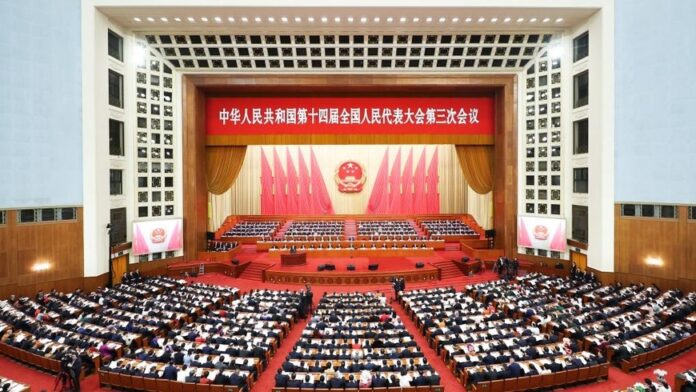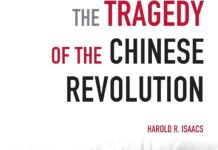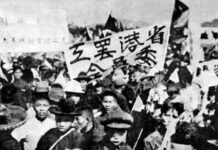The following is a speech given by ISA member Zhou Yi to a meeting of Chinese Marxists in May 2025
ISA and chinaworker.info describe China and the system led by the so-called Communist Party (CCP) regime as ‘authoritarian state capitalism’.
It is different from Western ‘free market’ capitalism, but it is still a capitalist state and a capitalist economy, not any kind of non-capitalist system. It is a special and very high level of state capitalism – we could say of a unique type.
What was Stalinism?
China replicates some features of other ‘state capitalist’ economic models of a previous era, such as Singapore, South Korea, and Taiwan. From 1949 to the 1980s, China was not a capitalist country. At the time it was a very chaotic, unstable form of Stalinism, i.e. a planned state-owned economy but where an unaccountable “Communist” bureaucracy ruled ostensibly on behalf of the workers. The Stalinist-Maoist bureaucracy was not a class. It was a parasitic privileged ruling caste.
Trotsky likened the Stalinist USSR to a bureaucratized trade union – its base was in the working class, but power and control had been robbed by the bureaucracy. Under Stalinism, because it ruled a whole country, economy and state, the bureaucracy acquired a huge degree of independence from the social base. This led many on the left to mistakenly believe that the bureaucracy was a “ruling class”. Trotsky, whose analysis of Stalinism and the deformation of the first workers’ state is one of the great treasures of Marxism, responded to all these wrong theories.
The restoration of capitalism in China that began with Deng Xiaoping did not bring about Western-style capitalism. This was never a likely perspective for China, because the CCP party-state itself carried out the counter-revolution and created a new bourgeoisie from within itself, using the totalitarian state as a massive lever to implement this agenda, directing and building up the economy in the interests of a new bourgeois ruling class.
Differences with Western-style capitalism
What are the differences between China’s special form of state capitalism and ‘free market’ capitalism in Europe and the United States? The CCP is a complete dictatorship. There is not a single democratic right under its rule. This is beyond debate and everyone knows it.
Furthermore, and crucially, in China the bourgeoisie developed from the CCP party-state and its capitalist counter-revolution, and has never been an independent factor.
Here is a parallel with other Asian states where the state has played a much bigger economic role than in Western capitalism, because in Asia, capitalism was a latecomer. The very weak national bourgeoisie needed a powerful and interventionist state to protect it – from much more powerful foreign capitalism and from the demands and pressure of the emerging working class.
This means that in China today the bourgeoisie and the CCP are inseparable. We stress that the CCP is not really a political party, but much more than this: it is the state apparatus.
When the Maoist bureaucratic planned economy reached a dead end in the 1970s, with the economy going backwards and the threat of mass unrest, the CCP tried to explore a way out – to “cross the river by feeling the stones” – and promoted incremental capitalist “reforms”. After the Tiananmen Square crackdown in 1989, the process of capitalist restoration accelerated.
Today’s capitalist CCP
Today, the leadership of the Chinese Communist Party is composed of the most important capitalist groups and cartels, covering energy, finance, mining, infrastructure, and transportation. They are not merely the ‘representatives’ of the capitalists as in Western countries, they are the core or dominant part of the capitalist class and directly control many sectors of the economy.
The CCP and Xi Jinping’s dictatorship will never allow the existence of a truly independent Chinese bourgeoisie that is beyond the control of the dictatorship. They will not allow private sector capitalists such as Jack Ma [owner of Alibaba] to have political power, nor will they allow them to enjoy the same status as Western capitalists such as Musk and Bezos.
The 2020 crackdown on Alibaba and its sister company Ant Financial, and other crackdowns were intended to weaken them and make them compliant with the CCP party-state.
Compared with conventional capitalism, the CCP-state needs much greater control over the economy. It fears that if it loses this control, centrifugal forces could bring down its rule. For example, the CCP must have control over the banking system and capital flows. Western capitalism in general has largely removed capital controls and lets currencies float ‘freely’, but this would pose a threat to the CCP’s rule.
If the CCP did not have such a high degree of control over the banks, China would almost certainly have already suffered a banking collapse after the 2021 real estate crisis. Control over the banks allowed the CCP-state to shift debt back and forth within the financial system, to conceal the scale of the crisis and buy time. They even arrest anyone who reveals the truth. Of course, this does not mean that the authoritarian regime has 100% control over every economic sector, but compared to Western ‘free market’ capitalism, the CCP does have more intervention and repressive measures against private enterprises.
However this doesn’t mean that the CCP has an infallible ‘vaccine’ against capitalist crisis, and even a full-blown financial crisis is possible in future despite the high degree of state control.
Is Xi reverting to “Maoism”?
In the past decade, Xi’s promotion of the doctrine “the state advances and the private sector retreats” has become a major trend. For example, we reported in 2018 that the state had acquired controlling stakes in at least 30 listed private companies. This figure is surely much bigger today. Xi’s regime has also required private and foreign companies to set up CCP ‘party’ branches.
Jack Ma was forced to hand over complete control of Ant Group to the CCP. This is because Ant Group, which expanded very quickly as a quasi-banking entity, had grown too big. It threatened to become a more powerful bank than the official banks controlled by the CCP. Jack Ma’s attitude towards finance was different, more ‘Westernized’ and risk-taking. The CCP cannot tolerate the existence of “two centers”, nor can it tolerate its policies being obstructed or countermanded by powerful economic entities groups outside its control. Therefore, Jack Ma’s business empire was cut down. The CCP declared this to be a campaign against “disorderly expansion of capital”.
Bourgeois commentators and ‘tankies’ only look at these phenomena superficially, clouded by their own ideology. They claim that these policies of the CCP represent “socialism”, or even that Xi sees Mao Zedong as a model. They always overlook the most important difference between Xi Jinping and Mao Zedong: they are both repressive, authoritarian regimes, both established a personality cult, but Mao’s rule was based on a bureaucratic planned and state-owned economy, while Xi’s rule is based on capitalism.
The CCP under Xi Jinping has from time to time suppressed private capitalists, but not to favour the working class. Rather it has done this to protect the entire capitalist system, and above all their own power, from the damaging actions of one or other sections of the capitalists.
Xi’s regime is what Marxists describe as a bourgeois Bonapartist regime, a very authoritarian one. A Bonapartist regime can strike blows even against the economically dominant class. In 1927, Chiang Kai-shek imprisoned the Shanghai bankers and forced them to hand over one million dollars. This was the “service fee” he demanded after he had massacred the vanguard of the Chinese working class and crushed the CCP.




